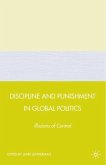Global politics is a crowded stage of players competing for power and authority. Who is in charge of what? How do they stay in charge and what are the effects? This volume raises these questions in case studies on regimes of torture and surveillance in women's rights, border control, media, global capital and religion.
"Foucauldian analysis seems particularly apt to assess the emerging regimes of control, deception, and domestic and international imperialism that mark the contemporary era in global politics. This volume is especially useful because of the way it integrates analysis of gender and of hegemonic masculinity, the disciplining of women and of sexuality, and the use of self-disciplining mechanisms more generally, in a range of international policy arenas. The authors show both the expansive and overwhelming power in contemporary global politics of institutional entities that are deeply undemocratic and hostile to the lives of ordinary people, as well as the potential, albeit constrained, for resistance to these institutions." - Jyl Josephson, Director of Women s Studies and associate professor of political science, Rutgers University, Newark
"The chapters in this important book illuminatingly apply Foucault s approach in empirically analyzing many issues, including disciplining women, shielding America, the global media, citizenship, torture and corporate social responsibility. Some of the analyses also suggest the possibilities of resistance in power relations." - Louis Kriesberg, Maxwell Professor Emeritus of Social Conflict Studies, Syracuse University
"The chapters in this important book illuminatingly apply Foucault s approach in empirically analyzing many issues, including disciplining women, shielding America, the global media, citizenship, torture and corporate social responsibility. Some of the analyses also suggest the possibilities of resistance in power relations." - Louis Kriesberg, Maxwell Professor Emeritus of Social Conflict Studies, Syracuse University








